- Music
- 11 Dec 24
Damien Dempsey: "I’ve stayed on my own a lot of my life... I’ve just been watching, and observing, everything"

Following the release of his acclaimed new album, Hold Your Joy – and in the run-up to his six-night run of December shows at Vicar Street – Damien Dempsey sits down to discuss ‘sacred’ singsongs, meditation, loss, Palestine, his socialist roots, the need for a left-wing coalition, the Catholic Church, and online misinformation.
“I’ve stayed on my own a lot of my life,” Damien Dempsey reflects. “I’ve been a loner, you know? So I’ve just been watching, and observing, everything. Trying to work out life – and trying to work out ways to deal with modern-day traumas.”
What’s been gleaned and gathered from those lifelong observations will be familiar to anyone who has connected with the soulful pulse of the Donaghmede singer-songwriter’s music over the past 25 years or so – from deep ruminations on mindfulness, pre-Christian wisdom, and mental health, to rousing lyrics about the state of the nation, and our shared social history.
On paper, it’s far from the kind of material that you’d imagine would fuel a successful career in a ruthlessly fast-moving, trends-driven music industry – particularly in the Celtic Tiger years, when he first emerged. But for many of his loyal fans, therein lies the appeal – with that unapologetic authenticity and disarming sincerity powering Damien to three No.1s on the Irish Albums Chart, countless sold-out shows, and a reputation as not only one of the country’s most beloved and uncompromising artists, but a crucial influence on an entire genre-transcending generation of homegrown acts.
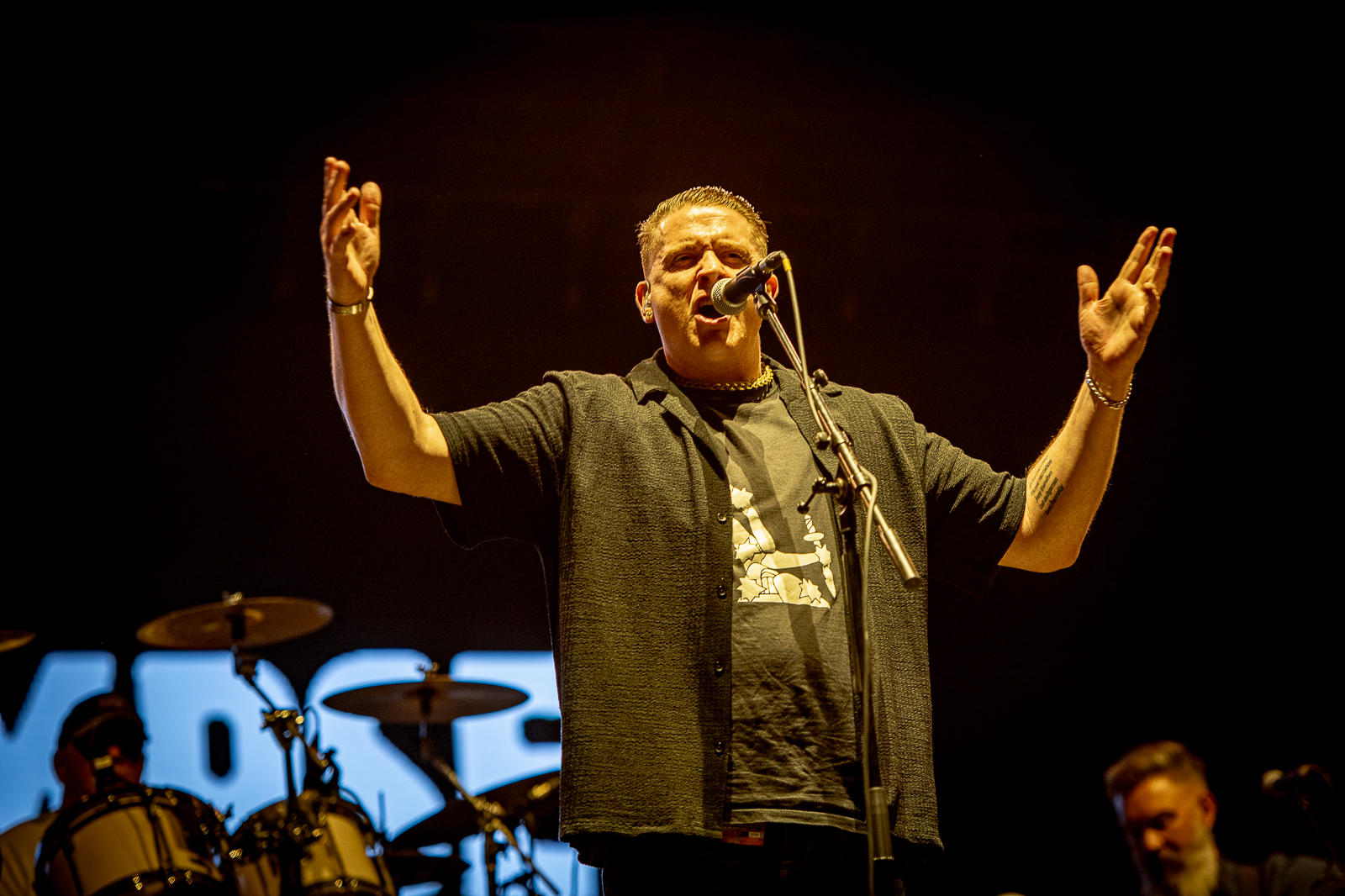
Damien Dempsey at Electric Picnic by Jason Doherty
In more recent years, his singular world view has been captured in documentary-form, in Ross Killeen’s award-winning 2021 film Love Yourself Today, and on the Abbey Theatre stage, in the Conor McPherson-directed Tales From The Holywell, which premiered last year. His latest project, however – the newly released Hold Your Joy – might be the purest distillation of his vision to date.
The album finds Damien carrying on the creative kinship that’s been central to his approach since 2003’s Seize The Day, with his close collaborator John Reynolds, a producer also well-known for his vital, longtime ties to Sinéad O’Connor. It arrives seven years after Soulsun, Damo’s last album of new music – a gap he puts down to both lockdown and John’s move from Kilburn in London to Enniskerry, Co. Wicklow, in the midst of Brexit.
“That took a good chunk out of our time,” Damien explains. “But he got to Wicklow, and he has this great studio there now. Most of his bones are here in Ireland – all his people. So he felt this ‘coming home’ thing, and that flowed into the album.
“He was saying, ‘Let’s try and do a softer album – and bring out the sweetness and tenderness in your voice,’” he continues. “We’d been wanting to do that for a while. In the Abbey [for Tales From The Holywell] I was able to pull it right back, and just have this nice soft, sweet voice. My da had that voice as well. I can’t really use it in a lot of the shows I do, because people wouldn’t hear it! But we’ve finally done it on this album.”
For Damien, Hold Your Joy is primarily about “healing”.
“I’m just putting down what I’ve learned, from travelling the world, talking to wise people, and listening,” he tells me, calling into Hot Press in the days running up to the release. “And what I’ve learned from being alive for nearly half a century.
“There’s solutions in it, I think, to modern-day problems,” he adds. “It’s going to be an album that helps people, if they open their hearts to it.”
In his music, Damien has always been open about his own experiences with what he refers to in conversation as “the darkness in the head” – or, as he describes it on Hold Your Joy’s ‘Push Through The Blue’, his “one greatest enemy” that’s “dwelling inside” of him. But recent years have also seen him contending with immense loss – in both his personal life, with the deaths of his father and uncle within a month of each other, and in the Irish music community, with friends and collaborators Sinéad O’Connor, Shane MacGowan, Séamus Begley and Christy Dignam having all passed last year.
One way he’s attempted to make sense of it all, is by embracing spirituality.
“I’ve been getting nudges all my life,” he says. “Lots of different things have happened to me – things you can’t explain. I’ve finally stopped disregarding them, and saying ‘coincidence’. I believe them now.”
One of these profound experiences coincided with the death of his father Frank in November 2021.
“He had learned a song, ‘Time To Say Goodbye’, to sing to his partner, Eta,” he recalls now. “When we were cleaning out the house after he passed, we found out that he had learned the Italian, phonetically, and then he’d sing the chorus in English.
“And that’s the song he died to,” Damien continues. “The next day, I was down the pub, writing the eulogy, and this woman at the bar – I later found out she was Italian – just burst into song, around nine o’clock on a Monday night. And started singing that song.”
The woman – one of the Macari family, who ran the chipper beside the pub – was later surprised to learn that her part in this story was being discussed on the Abbey stage, as part of Tales From The Holywell.
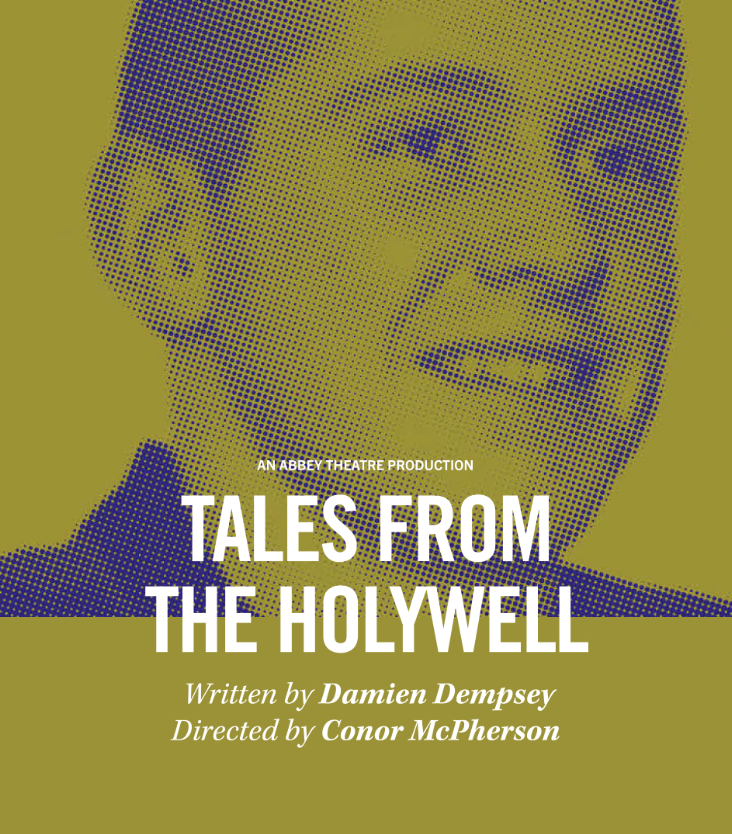
“She only comes back to Ireland every six months or so,” Damien says. “She couldn’t believe she was being spoken about in a play, so I told her, if it’s on again, I’d get her tickets. I asked her if she’d sing often, and she said, ‘No, I never sing in public. Something just came over me, to sing that song.’
“There’s been lots of things like that that have happened to me,” he adds. “It’s like they’re telling me to keep the faith – or at least keep an open mind. Don’t be saying this is all there is, because it’s not. It’s really not.”
The “loss of spirituality in the western world” is a big concern of Damien’s – particularly in Ireland, where he feels we’ve gone from being a “very spiritual people”, to a population who largely “don’t believe in anything anymore.”
“Atheism is not for Irish people, or any people, I don’t think,” he states. “We’re all like living ghosts walking around. What holds up this meat suit?!”
While Hold Your Joy delves whole-heartedly into spirituality, the track ‘Louise’ also addresses the role the Church has played in oppressing Irish women.
“The Roman Catholic Empire, as I call it, has pushed a lot of people away from spirituality,” Damien nods. “Some of the things they’ve done to the Irish people have been the total opposite of what Christianity should be. The women in the song ‘Louise’ are true Christians. They really practised Christianity: ‘do unto others as you’d have them do unto you’. The Roman Catholic Empire didn’t.”
The inspiration behind the track, he tells me, came from his grandmother in Cabra West, and the other women in the community.
“Some of them had 10, 15, 20 children,” he recalls. “They were the strongest people I’ve ever seen in my life. To be able to have all those children – and try to clothe and feed them with feck-all money – was unreal. And they’d still be slagging, but they’d also give you the shirt off their back. They were queens, they really were.
“And they didn’t all want to have all these children,” he continues. “My grandmother went to the local priest, after having twins – which made it eight children. She said, ‘Father, I can’t have any more kids.’ And the priest – in his nice house, with his maid there, and everything looked after for him – said, ‘Go home, and give your husband as many children as he wants.’”
It’s a story that continues to enrage him.
“You should never give people that much power over other people,” he asserts. “It was like the Dark Ages – with contraception, divorce, homosexuality and abortion all illegal. And that was even when I was young. So we’re only coming out of the Dark Ages now, really.”
Although he points out there are “still great people in the church” – like Sister Stan, whose recently released book Gratitude he contributed to – Damien thinks that it’s crucial we “cut ties with Rome”.
“Let priests marry,” he says. “Let women be priests. Let women marry women and men marry men in the priesthood. Bring traditional Irish music into the church, and sean-nós singing, and dancing. Make it a big sober session on a Sunday – a celebration. And get people back in. Because the vacuum is not good.”
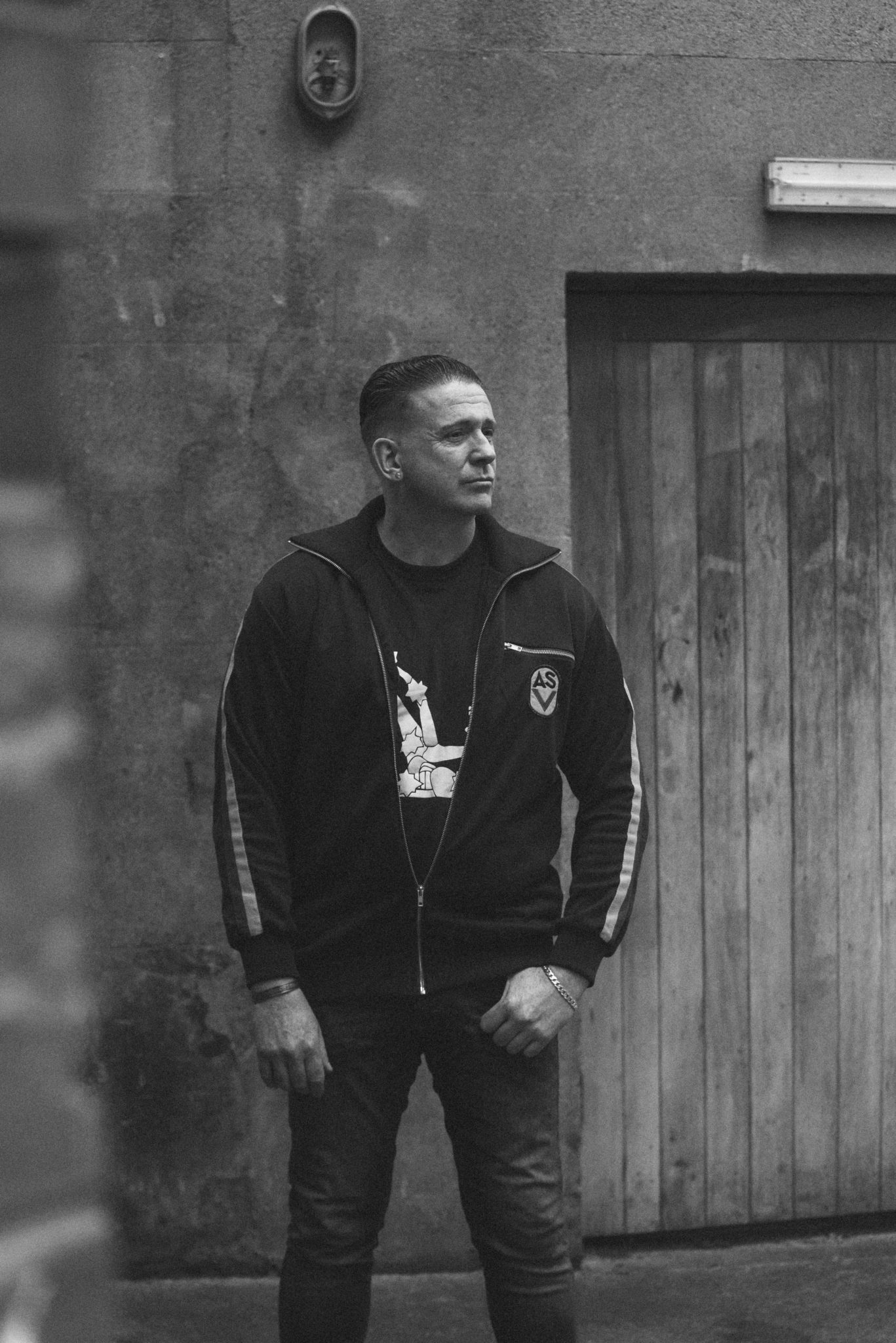
Damien Dempsey by Miguel Ruiz
He also feels that Ireland needs “a big day of mourning and grieving”, in order to deal with its trauma.
“My family are very badly traumatised,” he reflects. “My granda was in Letterfrack industrial school, and I had an uncle in Daingean industrial school. And I had a cousin in a Mother and Baby Home. We were badly mistreated by that empire. But we were sandwiched between two empires: the British Empire and the Roman Catholic Empire.
“So we need a national day of grieving and mourning,” he continues. “Go to a river or a lake, or down to the sea, and remember all our people who suffered under those empires. Say a prayer for them, and thank them for their strength. Talk about it, face it, and forgive it. Then we can move on better, into the future.”
Damien sees a direct line between that unaddressed trauma and many of the social problems that crop up across his discography – including, on ‘Devil’s Dandruff’, the grip cocaine continues to have on this country.
“The alcoholism, and the drug addiction, and the violence – it’s all connected,” he posits. “We have a big problem with addiction, all around the country. And if something’s messing up your life, you have to step back and think about it.”
During his own mental health struggles in his younger years, he says that discovering meditation was a life-changing experience.
“My mother was very forward-thinking,” he says. “She’s from a little house in Cabra West, but she got into yoga and meditation in the ‘70s. Her head wasn’t right herself, so she was searching for something to help – and she found this.
“So, when I was struggling, I asked her, and she reached out and put me onto it,” he continues. “And I think it saved my life.”
But meditation and gratitude, he says, are like “playing the guitar – you have to practise.”
“People try it for a week, and if it doesn’t happen for them, they say, ‘Ah, that’s not working.’” he notes. “It’s not going to work after a week. You have to keep doing it. I was desperate, so I kept doing it until something clicked. It was only about a minute, where the racing thoughts in my mind just stopped, and the fucking light shone in. And I could feel my soul.
“I’d tell people about it, and they’d be calling me a headcase and a weirdo,” he smiles. “But I didn’t mind.”
Although mindfulness has clearly played a role in shaping him into the artist he is today, Damien feels that the sense of compassion that defines his songwriting has even deeper roots.
“I had an aunty, Jennie Shanahan, who was with James Connolly in the Irish Citizen’s Army,” he tells me. “They were socialists, probably even more than they were republicans. They wanted a fairer island for everyone – for the working people. So that’s rooted in me, coming from her.”
He articulates his own political stance in no uncertain terms on one of Hold Your Joy’s stand-out songs, ‘Landlords in The Government’, which – while channelling the spirit of his searing 2003 track ‘Celtic Tiger’ – features the timely refrain: “Vote them out, for the first time in the history of this State…”
“I’d just love to see someone else get in, instead of Fianna Fáil/Fine Gael, perpetually, forever,” he reflects – speaking ahead of the General Election. “I don’t care what they say – when working people in a rich country can’t afford a home, it’s a load of bollix. We need someone else to have a go. If you don’t like them, vote them out – but let’s not just have Fianna Fáil/Fine Gael forever. At least if Fianna Fáil and Fine Gael were voted out, they’d have to then regroup and readjust, and maybe come back better.
“We just need a bit of change,” he continues. “A left-wing coalition, I think, is the only way at the moment. Let’s give it a go anyway.”
The track ‘Born To Love’, meanwhile, asks: “If your god is so great, why does he condone your hate / For fellow humans in states of fear and brutality?” – before going on to note that “abominable crimes from colonial times are still poisoning minds.” They’re lyrics that feel particularly relevant in the context of Israel and Palestine – an issue Damien has been outspoken about, while supporting the people of Gaza through fundraiser gigs.
“With the Balfour Declaration, the British were giving someone else’s land away,” he says. “Saying, ‘Here, take that land there. Don’t mind the Palestinians.’ Now we can see the hatred that they’ve caused by doing these things – a traumatised people who’ve gone in there now, taking their trauma out on these people. And there’s so many Jewish people totally against this, but we don’t get to hear their voices.
“It’s a crazy fucking situation,” he continues. “There’s people from New York going over there and smashing down homes, and building their own homes on top of them. America are backing it all up, and the Irish government are letting armaments through Ireland. It’s sickening, and it’s hard to know what to do, except keep our solidarity – and shame them.”
Damien has been encouraged to see Irish musicians leading the charge internationally when it comes to using their platforms to express solidarity with the people of Palestine. That movement – in which knowledge of a shared history of oppression plays a major role – has also coincided with more and more acts, spanning multiple genres, embracing their Irishness as a crucial part of their artistic identity.
“It’s a beautiful resurgence, isn’t it?” Damien smiles. “I caught the end of the ballad boom. All the great bands flourished in the late ‘60s and ‘70s, and it sort of fizzled out in the ‘80s, just as I was getting into the music. Then the rave scene came, and all the boy bands – and I was going, ‘What the fuck…?’
“So to see it flourishing again – the love of our past and our tradition – and young people breathing new life into it, is incredible. It’s making me so happy.”
Speaking to Hot Press at the Kneecap film premiere in Dublin earlier this year, Damien revealed that the hip-hop trio had inspired him to dive back into the Irish language.
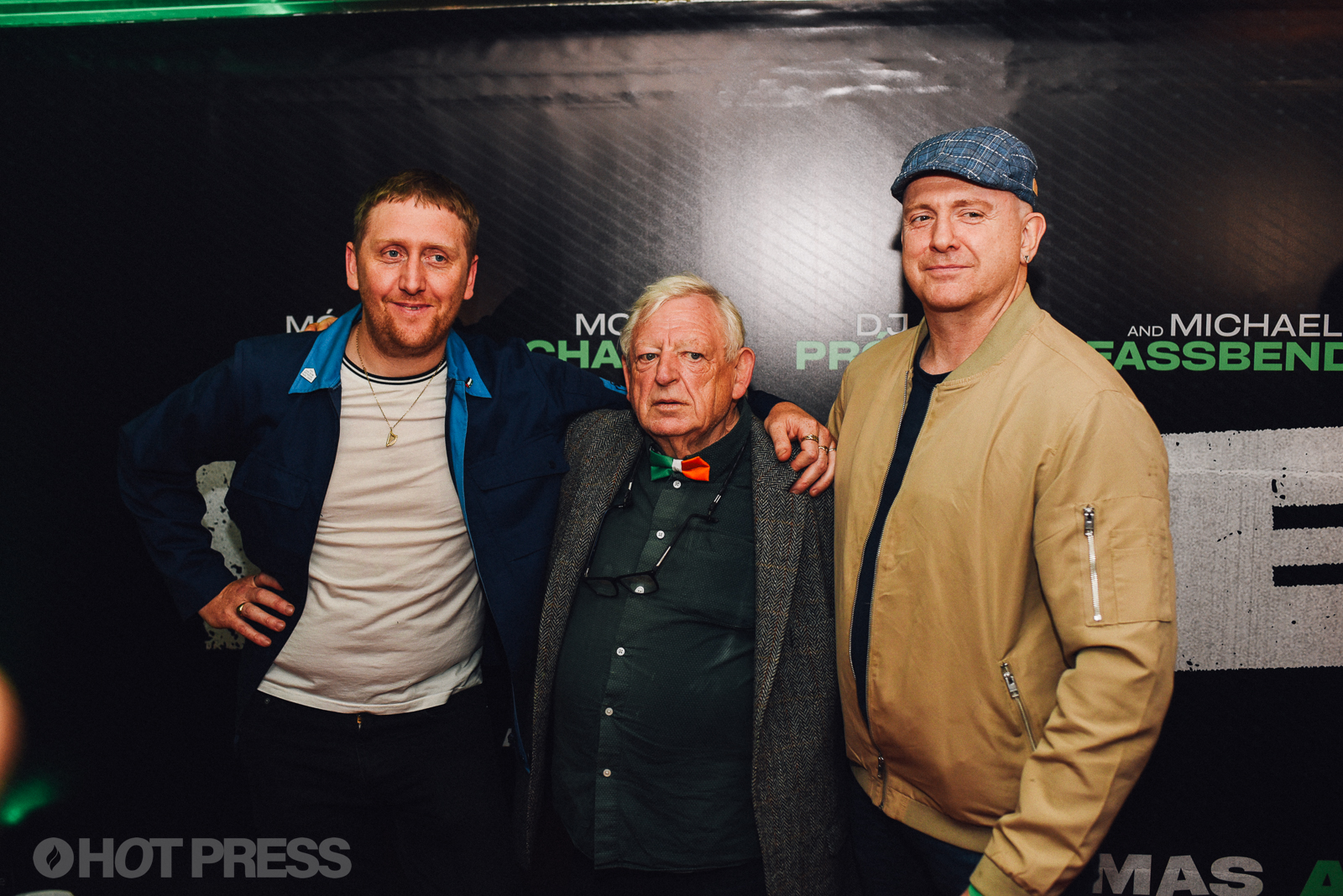
L-R: Daniel Lambert, Nicky Kelly and Damien Dempsey at the Kneecap premiere at The Lighthouse Cinema. Copyright Miguel Ruiz.
“I’m accumulating lots more words, and using whatever bits of Gaeilge I have – seasoning my Bearla with a bit of Gaeilge,” he laughs. “Some day when I have the time I’m going to go down to the Gaeltacht, and get a proper whack at it. But the bits I have, I cherish.
“There was a barrier there, and the Kneecap lads have smashed that barrier somehow,” he adds. “And they’ve broken down that snobbery that sometimes came with the Gaeilge. They’ve made kids, and everyone, want to learn more. That’s draíocht – it’s magical what they’ve done.”
He pays tribute to another contemporary Irish hero on the Hold Your Joy track ‘James McClean’ – saluting the Derry-born footballer’s refusal to wear a poppy on the pitch, and his bravery in the face of abuse from the stands.
“I heard about the sectarianism and the hatred he was getting out there in England, competing with the best,” he reflects. “And I love his stance. Anybody who stands up for what they believe in, and takes the flack for it – all the bullshit and hatred – I have respect for. Meas mór to aul James.”
Of course, hatred also appears to be on the rise on this side of the Irish Sea. A year on from the Dublin riots – and following months of anti-immigration rhetoric and arson attacks – Damien is concerned that “there’s a lot of people being indoctrinated online, by different ideologies.”
“I’d love for people to come off social media, and just think for themselves,” he remarks. “I remember in the old days, when the buses wouldn’t be on time, you’d be standing there at the bus stop for an hour sometimes – just contemplating things, and thinking. Now the phone seems to think for people.
“And people are being led,” he continues. “They’re saying that other people are being led, but they’re being led – because the phone tells them what to think. We can all be so impressionable – even myself. If someone says something with conviction on a podcast, sometimes you can just fall for it hook, line and sinker – instead of researching it, and asking yourself, ‘What do I really think about that?’ You need to work life out for yourself – and not be told how to do that by your phone or by podcasts.”
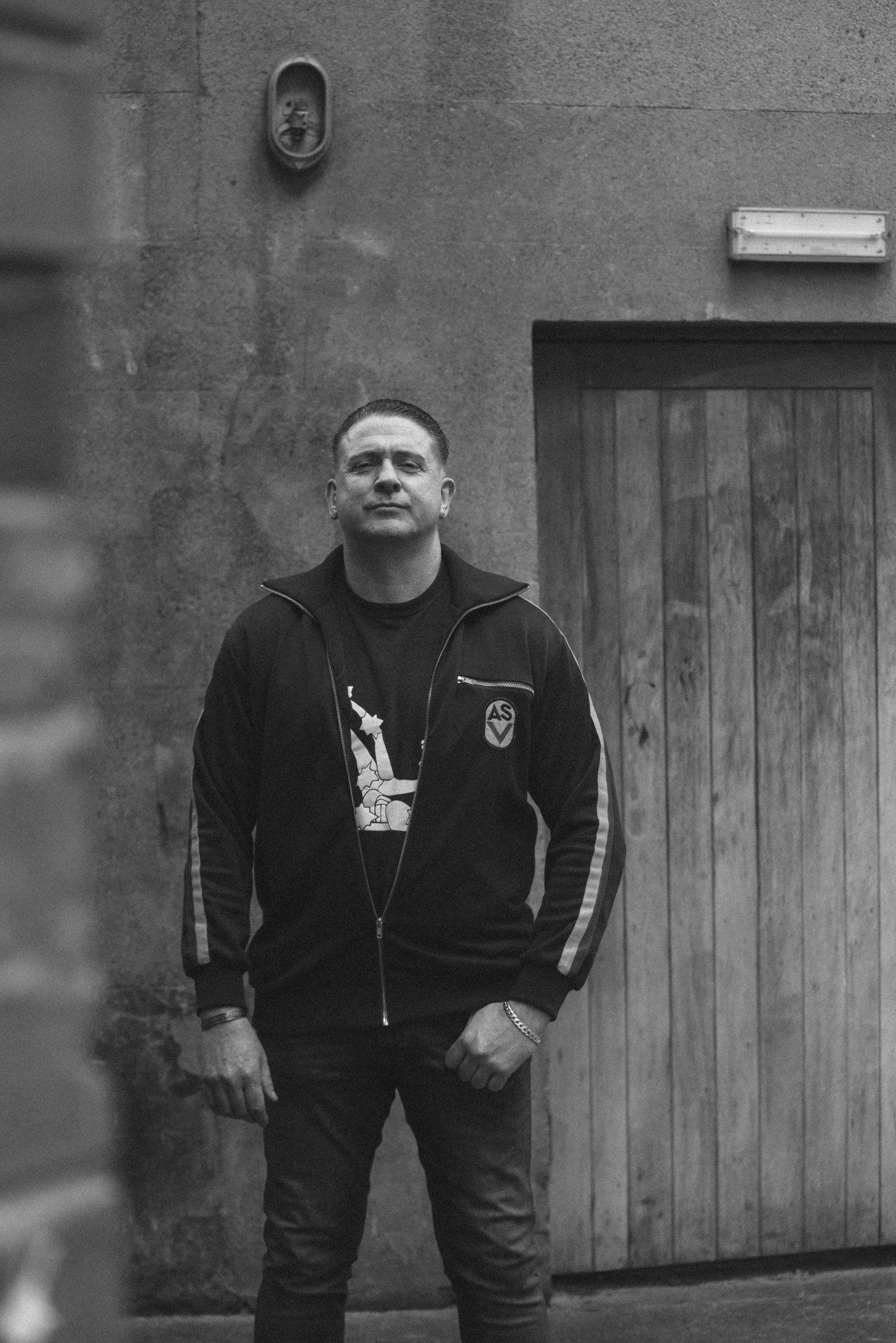
Damien Dempsey by Miguel Ruiz
Damien, meanwhile, continues to turn to deeper wells of inspiration – with plans already underway to follow Hold Your Joy with a traditional album.
“I want to get my mother, and my uncle, singing on it, and a few of my old friends playing on it,” he tells me. “There’s some beautiful old songs that I’d love to get to the young people.
“I’ve a lot of young fans,” he continues. “They’ve no fucking choice, God love them – it’s the parents! But my lyrics aren’t very flashy or abstract – they’re direct, like the old ballads – so they’re accessible for young people. And I know if I do this traditional album, these young kids will be singing the songs, and they’ll be passed on.”
To Damien, “the singsong is a sacred link to our Gaelic past” – and as such, is a tradition that we all need to play a role in keeping alive.
“When you sing, you can’t think of the past or the future,” he reflects. “You just have to be there, right in the moment – because you have to remember the next line, and try to stay in time, and nearly in key. Communal singing is one of the best things you can ever do.
“I’ve tried to bring that to the stage, and make any venue I go to like a big singsong – because there’s fierce healing in a singsong.”
Hold Your Joy is out now. Damien Dempsey plays Vicar Street, Dublin (December 16, 17, 19, 20, 22 & 23) and Gleneagle INEC Arena, Co. Kerry (December 31), before embarking on an Ireland and UK tour in 2025. See damiendempseymusic.com for further details.
RELATED
RELATED

- Culture
- 25 Jul 22
Dublin avant-garde punks Meryl Streek sign to Venn Records

- Opinion
- 04 Mar 22








